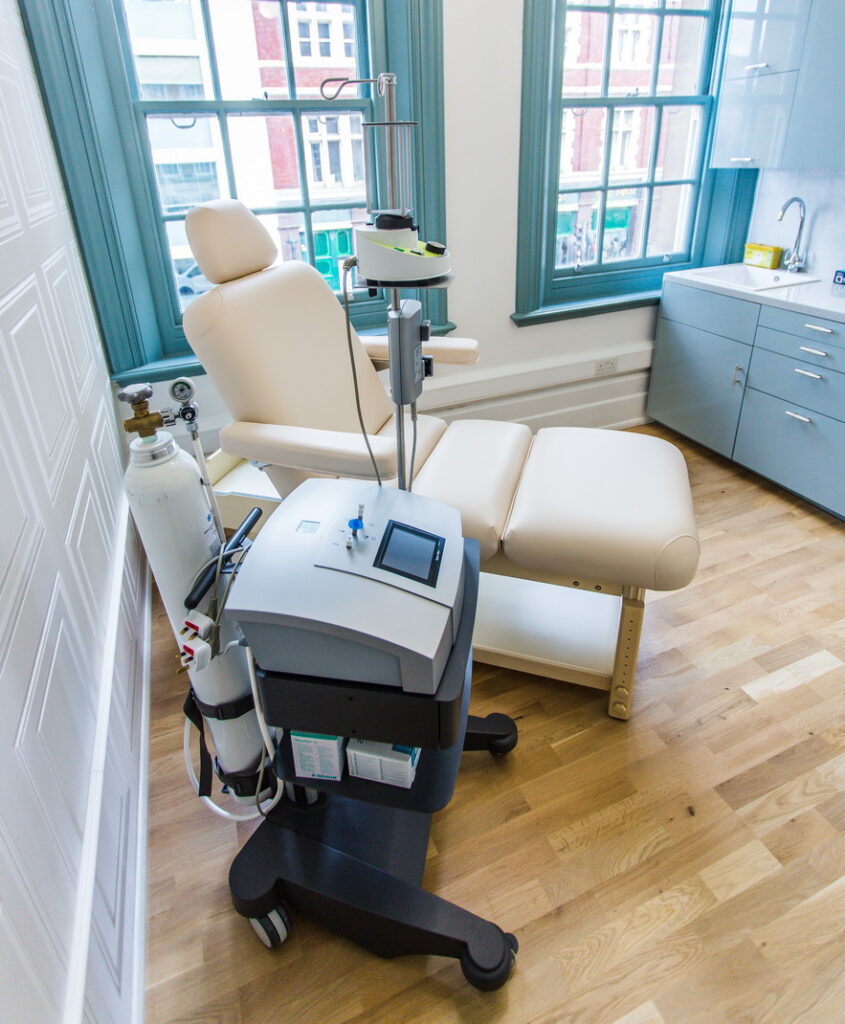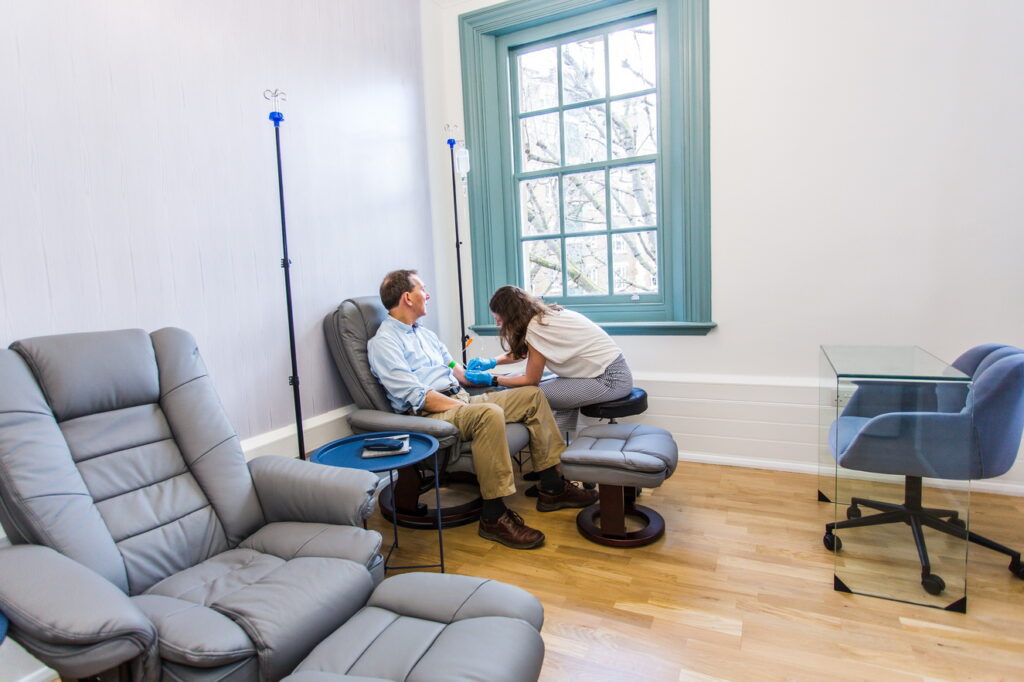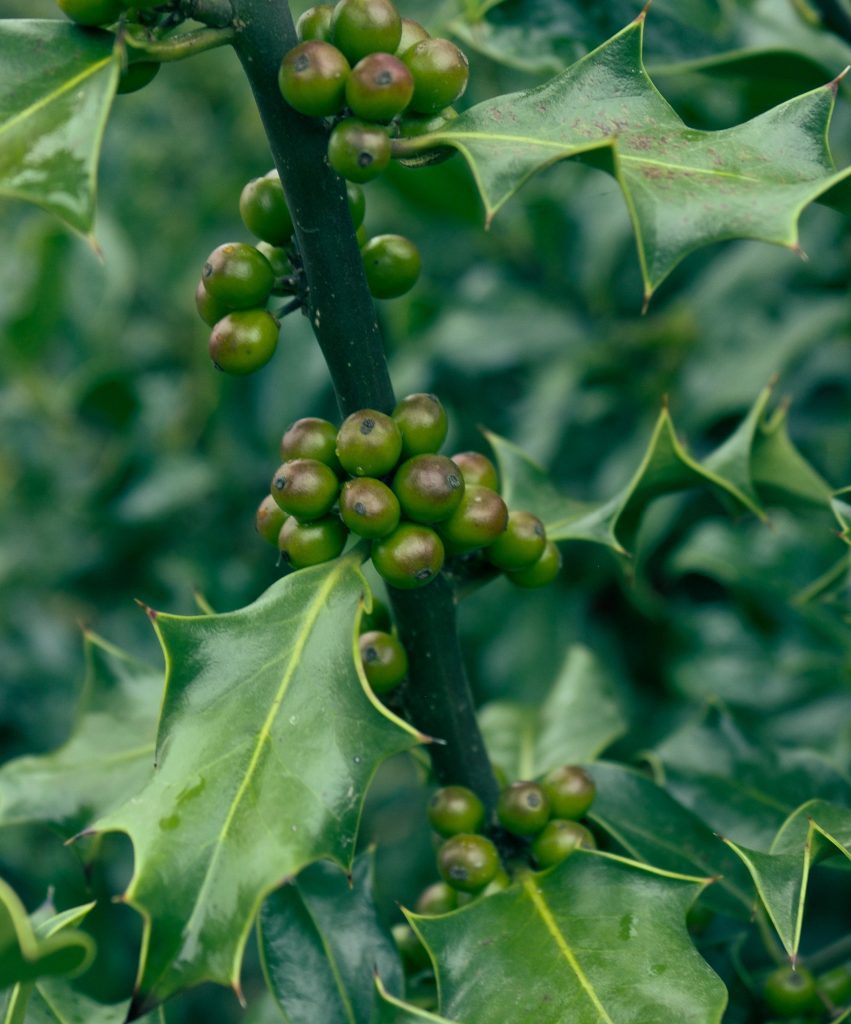Our high-dose vitamin C IV therapy is designed to provide a personalised, complementary solution to work alongside your cancer treatment. Our IV infusions are tailored to your unique needs to ensure you receive the highest level of care.
What is high-dose vitamin C IV therapy?
High-dose vitamin C IV therapy boosts your body’s vitamin C levels. Vitamin C is an essential nutrient that is vital for your health, as it helps support collagen production, wound healing and healthy bones and teeth. Without enough of it, our bodies can also struggle to grow and repair tissues effectively.
Our high-dose vitamin C IV therapy delivers pure vitamin C through an intravenous line (a soft, flexible tube inserted into a vein in your arm). We provide you with every comfort you need during your therapy so you can stay relaxed throughout.
When we administer vitamin C through an IV, it can reach higher levels in your blood than if you were to take it orally. This means you get to reap all of the benefits that this vitamin can bring. It’s designed to support your body when going through Western-style cancer treatment and increasing research is showing that vitamin C may have anticancer properties.
Our high-dose vitamin C IV therapy takes between 30 minutes and one hour to complete.


Key benefits for cancer patients
High-dose vitamin C IV therapies can offer numerous potential benefits to cancer patients. It also does not interfere with any ongoing cancer treatment and can be a good way to increase your nutrient intake.
Some of the benefits of receiving high-dose vitamin C IV therapy can include:
- Reduced side effects of cancer treatment – for example, you may experience an increased appetite and reduced level of nausea
- Potentially slowed growth of cancerous tissues and cells
- Less fatigue and boosted energy levels
- Improved red blood cell production
- Increased white blood cell production to support your immune system
- Improved body tissue repair
- Reduced oxidative stress (an imbalance within the cells of your body that can cause damage to your organs and tissues)
These benefits may support your wellbeing when undergoing cancer treatment and help you regain some control over cancer treatment side effects.
Are there any risks of high-dose vitamin C IV therapy?
High-dose vitamin C IV therapy has a very low risk of side effects. However, it can be problematic if you have kidney disease or kidney failure. Therefore, our team will work with you to determine whether this therapy is right for you.
Our patient stories
One of our patients, Jemima, came to us after unexpectedly being diagnosed with breast cancer. We created a personalised therapy plan to complement her treatment that included vitamin C IV therapy.
Jemima has since let us know that she is “feeling well” and that “her lesion is under control”. She said:
“The medical team at Wellbeing Medical Group have offered constant support to me during these past few months, overseeing all my clinical needs and offering emotional support and strength.”
Learn more about how we’ve helped cancer patients on our dedicated patient stories page.
Supporting research for high-dose vitamin C IV therapy
Recent research has highlighted the anti-cancer properties of high-dose vitamin C IV therapy such as targeting the weaknesses of cancer cells such as redox imbalance, epigenetic reprogramming and oxygen sensing regulation.
Numerous studies have shown that vitamin C may be effective in supporting the health and wellbeing of patients with various cancers including leukaemia, colon, melanoma, pancreatic and prostate cancers. Vitamin C has been suggested to disrupt the metabolism of cancer and potentially enhance the effectiveness of chemotherapy.
Clinical trials of high-dose vitamin C IV therapy have found that it is safe and efficient for cancer patients to undergo alongside traditional cancer treatments.
Many other studies have shown encouraging anti-cancer activity of Vitamin C at high doses in various cancer types. The most investigated have been leukaemia, colon cancer, melanoma, pancreatic cancer and prostate cancer.


Similar results have been described for the treatment of:
- Non-small-cell lung cancer (NSCLC)
- Breast cancer
- Ovarian cancer
- Hepatocellular carcinoma
- Malignant mesothelioma
- Thyroid cancer
- Oral squamous cell carcinoma
- Neuroblastoma
- Glioma (including the difficult-to-treat glioblastoma multiforme)
More research shows mounting evidence indicating that Vitamin C has the potential to be a potent anti-cancer agent when administered intravenously and in high doses).
Early-phase clinical trials have confirmed the safety and efficacy of intravenous vitamin C in eradicating tumour cells of various cancer types and reducing side effects of treatments like chemotherapy.
High-dose Vitamin C administered has been shown to be safe and well-tolerated in cancer patients and reduce pain and improve quality of life in the palliative care setting.
Learn more about the supporting research behind high-dose vitamin C IV therapy.
Why choose high-dose vitamin C IV therapy at Wellbeing Medical Group?
At Wellbeing Medical Group, our high-dose vitamin C IV therapy is designed with your happiness and health in mind. We’ll tailor your dosage to meet your unique needs and provide you with end-to-end support.
You’ll also enjoy high-end comfort during your therapy and experience a nice, calm environment during your therapy. We’ll help you reach your health goals while undergoing cancer treatment, using a range of complementary therapies administered by our expert cancer care consultants.
Our high-dose vitamin C IV therapy may also complement other IV infusion therapies, for instance, such as our IV mistletoe therapy.
Booking with us is simple. All you need to do is contact our team and one of our dedicated cancer care consultants will be happy to talk you through the options.

Patients outside of London
If you’re based outside of London and are seeking complementary cancer therapies, our team can help. We offer a dedicated concierge service that’s delivered directly to your door.
We also offer an at-home intravenous infusion programme, allowing you to receive supportive therapies from the comfort of your own home.
Get in touch with Wellbeing Medical Group
If you’re undergoing cancer treatment and are looking for complementary therapies that support your wellbeing, get in touch.
Our committed team of cancer care consultants are here to answer any questions you may have and advise you on which therapy is right for your needs.
Sources
- https://www.cancer.gov/about-cancer/treatment/cam/patient/vitamin-c-pdq
- https://jeccr.biomedcentral.com/articles/10.1186/s13046-021-02134-y
- https://wellbeingmedicalgroup.com/services/intravenous-iv-infusion-therapy/high-dose-vitamin-c/
- https://www.healthline.com/health/oxidative-stress
- https://www.ncbi.nlm.nih.gov/pmc/articles/PMC5719364/
- https://pubmed.ncbi.nlm.nih.gov/22021693/
National Coverage Available
Are you based outside of London seeking medical support with a complementary cancer care consultant?
Other Therapies
Mechanical Lymphatic Drainage Therapy




